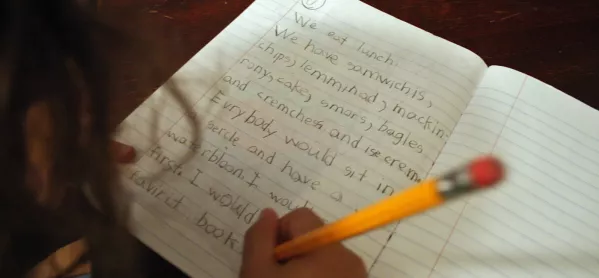After a great deal of teacher-talk about how the grammar and punctuation requirements for the end of key stage 2 writing stifled both teacher and pupil creativity, the STA responded in September with revised assessment descriptors for the new 2017-18 academic year.
Everyone appeared relieved.
However, for me, a bitter taste lingered. During the summer holiday, I was disappointed to read many comments on social media platforms suggesting that if a specific cohort had achieved higher in writing than reading and grammar, punctuation and spelling (GPS), then there must be something fundamentally wrong with the teacher assessment.
Moreover, some even went so far as to suggest that these same schools may have “cheated” to ensure their pupils met age-related expectations.
Sats conundrum
It is true that, for the past two years, standards for writing at the end of KS2 have been higher than they have been for both reading and GPS. Does this mean there is something wrong with teacher assessment for writing? Or might it suggest that, in spite of the difficulties and ambiguities, pupils had managed to successfully incorporate complex punctuation and grammar within both fiction and non-fiction writing?
This conundrum needs to be answered.
Do I believe Year 6 pupils can meet the required standard for writing but fail the reading and GPS tests? Yes, I do. Do I believe it is possible for children to write creatively while also being required to use a semi-colon? Yes, I do.
The difference between writing, reading and GPS at the end of KS2 is, of course, that the former is teacher assessed and the latter two are tested. This is not such a basic point as it might seem.
One can only prepare pupils for a test up to a point. Not even the most skilled, empathetic and thoroughly prepared teacher can eradicate all traces of pupil anxiety before or during a test, nor indeed, can a teacher entirely predict what texts a pupil might be tested on, or what types of question a pupil might encounter.
Teaching and assessing writing is an entirely different experience altogether. Not only is writing no longer tested, but also a pupil is also allowed a longer period during their final primary year to perfect it - an extra six weeks, to be precise - and this comes after Sats are finally out of the way. During these precious weeks, a teacher can bring all of their knowledge and inspiration to enable pupils to further develop and refine their writing skills.
Making it count
My aim was for my class to each produce five or six pieces of quality independent writing in time for the teacher assessment deadline. We used the well-respected novel Hatchet by Gary Paulsen to inspire our writing. Using a first-rate text such as this not only inspires children to write, but is also a fabulous teaching vehicle when revising correct use of grammar and punctuation.
I was able to remind my pupils about the difference between active and passive, colons and semi-colons without ever having to resort to tedious, discretely-taught SPAG lessons - everything began and ended with the novel.
When we needed details for our news report on an aeroplane crash in the Canadian wilderness, we were able to refer to the novel. On other occasions, when we needed examples of sentences containing complex punctuation, yet again, we could refer back to the novel.
This style of teaching and learning not only provides a child with the enjoyment of reading, but it also gives them the confidence to become a successful writer. As teacher and pupils immerse themselves in a quality reading experience, the inspiration for writing comes much more easily.
Secure attainment
In this way, the teacher offers a novel in the classroom almost as a chef serves up a quality dish in a restaurant. When children are enthralled by a text, they naturally enjoy talking about it, and this talk leads to motivational writing. At the end of our six weeks, every child in my class had each written five quality pieces of independent writing.
Mention must be made of our visit from an external writing moderator, who approved all my teacher assessments, bar one child. It is also worth mentioning that this was a challenging Year 6 cohort, a cohort where a significant number of pupils had scored below level 2b in writing at the end of KS1.
However, at the end of their last primary school year, my class achieved excellent writing results - and their performance in writing was better than their results in both the reading and GPS tests.
Amelia Ellis is a Year 5 and 6 teacher and English Lead at Woolavington Village Primary School, Somerset. She tweets @AmeliaEllis23
Want to keep up with the latest education news and opinion? Follow Tes on Twitter and Instagram, and like Tes on Facebook



